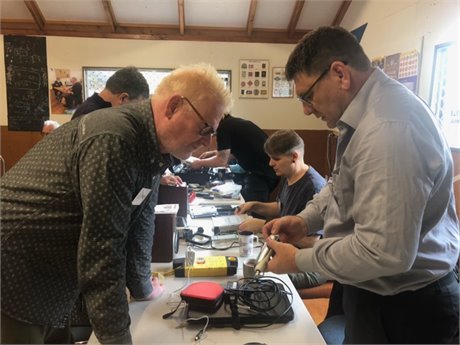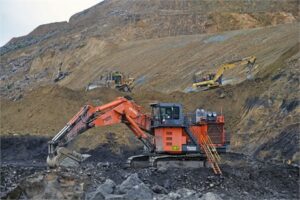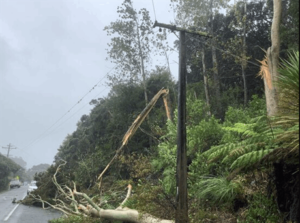 |
| :Raumati South repair cafe |
Last July, Repair Café Aotearoa presented environment minister David Parker with a petition signed by 12,901 people calling on the government to introduce right to repair legislation.
Consumer New Zealand has followed up that petition with one of its own asking the government to mandate a repairability label – it’s been signed by more than 10,400 and counting.
It’s a movement that all about slowing down and reversing society’s headlong rush into planned obsolescence.
its advocates would like to see legislative changes happen much faster to make repairing goods both realistic and economic.
And it appears the government is listening.
A spokesperson for e David Parker said a final decision on what will be included in new waste legislation is expected before the end of the year and a Bill is expected to be before parliament next year.
Proposed legislation, consulted on last year, set out regulation-making powers that would enable the government to require information that supports repair; the provision of spare parts for a set period of time, and the labelling of products for their repairability.
“The requirements would not apply to all products by default, but would be applied to specific types or categories of products by regulation that would be made under new legislation,” the spokesperson said.
Repair Café Aotearoa co-founder Brigitte Sistig says New Zealand has a unique opportunity to introduce comprehensive legislation that enables a truly circular economy that encourages the repair – rather than recycling – of electronic and other products.
The US, Europe, and Australia all have introduced right to repair legislation but it tends to take a piecemeal rather than a comprehensive approach, she says.
Sistig says people are incredibly keen to repair their products with the number of repair cafes growing from one in Auckland in 2016 to more than 40 right around the country now.
This year alone has seen 16 established with another 16 planned for next year.
She says about 24% of electrical goods currently can’t be repaired due to planned obsolescence
A recent repair café in Raumati South, north of Wellington, saw locals bring in 114 items for repair. Eighty percent were successfully repaired.
Electrical goods are repaired or signed off by qualified electricians.
Sistig says the right to repair is the gateway to a truly zero waste society. “We need to move away from recycling… recycling is not really part of a circular economy.”
The Repair Café’s submission to parliament describes planned obsolescence as “the deliberate policy of designing products, so they do not last very long and are not designed to be repairable.
“Common examples of planned obsolescence in electronic products are where manufacturers: frequently upgrade products, withhold spare parts, glue batteries in place (which makes them difficult to replace), require proprietary tools be used for repairs, build product software that restricts repairs to authorised dealers, or prevent software updates for older models.”
The submission lists nine Acts of parliament that impede the right to repair and need amending. They include: the Copyright Act, the Consumers’ Guarantee Act, Fair Trading Act, and the Patents Act.
Earlier this year, Consumer NZ attached GPS trackers to goods that had been returned to the retailers with faults that were repairable.
The results were mixed: three items ended up going straight to landfill, two were stripped of useful parts and recycled, and one was repaired.
(First published 13 December.)
- SEO Powered Content & PR Distribution. Get Amplified Today.
- Platoblockchain. Web3 Metaverse Intelligence. Knowledge Amplified. Access Here.
- Source: https://www.carbonnews.co.nz/story.asp?storyID=26640
- 1
- 10
- 2016
- 9
- a
- About
- Act
- acts
- advocates
- All
- alone
- and
- Another
- applied
- Apply
- approach
- around
- Australia
- batteries
- before
- Bill
- bring
- build
- calling
- categories
- Changes
- circular economy
- Co-founder
- comprehensive
- consumer
- copyright
- country
- Currently
- David
- December
- decision
- Default
- Demand
- designed
- designing
- difficult
- down
- Economic
- economy
- Electronic
- enable
- enables
- encourages
- Environment
- established
- Europe
- examples
- expected
- fair
- faster
- final
- First
- followed
- frequently
- from
- gateway
- going
- goods
- Government
- gps
- Growing
- guarantee
- happen
- headlong
- HTTPS
- in
- include
- included
- incredibly
- information
- introduce
- introduced
- IT
- items
- July
- Keen
- Label
- labelling
- Last
- Last Year
- Legislation
- Legislative
- Listening
- Lists
- Long
- made
- make
- MAKES
- mandate
- Manufacturers
- mixed
- models
- more
- move
- movement
- Need
- New
- New Legislation
- New Zealand
- next
- normal
- North
- number
- ONE
- Opportunity
- Other
- own
- parliament
- part
- parts
- Patents
- People
- percent
- period
- Place
- planned
- plato
- Plato Data Intelligence
- PlatoData
- policy
- powers
- presented
- prevent
- Product
- Products
- proprietary
- provision
- published
- qualified
- realistic
- recent
- Regulation
- repair
- repairing
- replace
- require
- Requirements
- Results
- retailers
- rush
- Said
- set
- signed
- Slowing
- So
- Society
- Software
- South
- specific
- spokesperson
- straight
- submission
- Successfully
- Supports
- Take
- The
- their
- this year
- thousands
- three
- time
- to
- tools
- Trading
- types
- under
- unique
- Updates
- upgrade
- us
- Waste
- What
- which
- will
- would
- year
- Zealand
- zephyrnet
- zero












